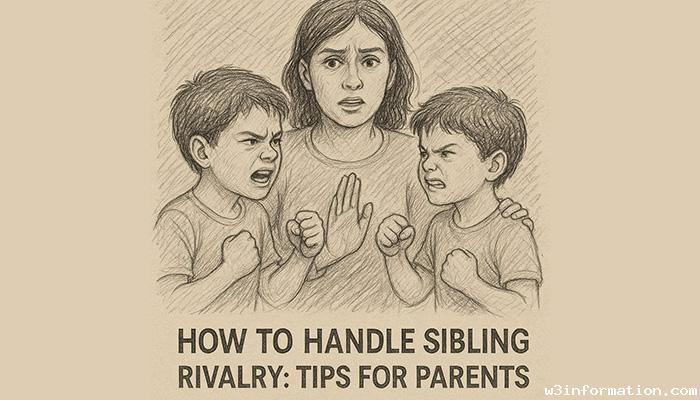How to Handle Sibling Rivalry: Tips for Parents
Families frequently experience sibling rivalry which manifests through competitive behaviors and jealous reactions between brothers and sisters. Some sibling rivalry represents normal developmental stages yet continuous fighting creates stress between family members. Parents can create a peaceful home environment through knowledge about sibling rivalry causes and implementation of management strategies.
Understanding Sibling Rivalry
The Nature of Sibling Rivalry
Sibling rivalry emerges during early childhood and can persist through adolescence or adulthood. Sibling rivalry appears through different behaviors including toy fights, competition for parental attention and verbal arguments. Sibling rivalry develops because of multiple factors such as age differences between siblings alongside temperament variations and expectations held by parents.
Factors Contributing to Sibling Rivalry:
1) Developmental Stages: Different developmental stages influence the behavior of children as they progress through life. Different developmental stages such as toddler tantrums and preschool possessiveness together with adolescent identity formation amplify sibling rivalries.
2) Competition for Attention: Children frequently compete to gain their parents' attention and approval. The competition between siblings becomes significantly more intense with the arrival of new siblings.
3) Personality Clashes: Every child has a unique personality. Siblings who exhibit different temperaments or interests often experience conflicts that result in misunderstandings and disputes.
4) Parental Expectations: Parental perceptions and interactions with their children play a crucial role in shaping sibling relationships. When parents exhibit favoritism or set unrealistic expectations sibling competition feelings become stronger.
5) Societal Influences: Children’s perceptions and behaviors towards their siblings are affected by external influences including peer interactions as well as educational and media representations of sibling relationships.

The Impacts of Sibling Rivalry
Emotional Distress
Ongoing sibling competition creates emotional distress for both the siblings and their parents. The need to compete for parental love and attention causes children to experience jealousy as well as feelings of inadequacy and frustration.
Strained Family Relationships
Intense sibling rivalry has the potential to damage relationships between siblings and among all family members. The presence of tension within a household can break down family unity and produce permanent problems in family relationships.
Impact on Development
Ongoing sibling rivalry creates effects that reach beyond the home and impacts children’s ability to develop social skills and self-esteem along with their capacity to build relationships outside their family.
Practical Strategies for Parents
Foster a Cooperative Environment
Parents can effectively decrease sibling rivalry by establishing a cooperative environment within their home.
Promote Teamwork
Get siblings to team up for household tasks and projects. When children take on shared responsibilities they develop camaraderie and discover how valuable teamwork can be.
Organize Group Activities
Create group activities that necessitate teamwork like fort construction, meal preparation, or sports participation. Bonding between siblings strengthens while competition decreases through collaborative experiences.
Encourage Individuality
The unique nature of every child requires us to nurture their personal strengths and interests.
Celebrate Individual Achievements
Make sure to acknowledge every child’s accomplishments regardless of their size. When you publicly commend children for their special abilities you help them feel validated in their unique identity.
Support Personal Interests
Children should be encouraged to explore personal interests and hobbies beyond their family environment. When we provide support for their personal interests they develop greater self-confidence and experience less sibling rivalry.
Implement Fair Conflict Resolution
Train children to handle disputes through equitable and productive solutions.
Set Ground Rules
Define explicit behavioral guidelines to follow during disagreements. During disputes physical violence and verbal insults must not be permitted.
Use “I” Statements
Guide children to articulate their emotions through personal expressions instead of blaming language. The sentence "I feel upset when my toy is taken without asking" helps create better communication between children.
Mediate When Necessary
When disputes intensify take action using peaceful resolution techniques to demonstrate appropriate behavior. Teach children to discover shared interests and work together to resolve disagreements.
Promote Empathy and Understanding
Fostering empathy among siblings transforms their views towards each other which results in less competition and increased collaborative behavior.
Teach Emotional Literacy
Help children identify and express their feelings. As children develop emotional literacy they gain a deeper understanding of their own feelings as well as the emotions of those around them.
Role-Playing
Utilize role-playing exercises to help children investigate multiple viewpoints. The method promotes enhanced empathy and understanding of diverse perspectives.
Allocate Quality Time
Parents who divide their time and attention equally among their children can reduce feelings of jealousy and competition between siblings.
One-on-One Time
Regularly schedule individual time with each child. When parents give their children focused attention it displays love and builds a stronger parent-child connection.
Shared Family Time
Family activities hold significant importance alongside one-on-one attention. Regularly engaging in family game nights or movie evenings and outdoor adventures builds family unity.
Set Expectations and Boundaries
Defining behavioral expectations helps decrease sibling rivalry.
Establish Household Chores
Establish a chore distribution system that ensures equal responsibilities for all siblings. Such a structure contributes to reducing feelings of disenfranchisement among siblings.
Create a Shared Space
Set rules for how toys and games will be shared among children in designated common areas. When families talk about these rules they create clear expectations which helps to prevent arguments about possessions.
Seek Outside Help If Necessary
Parents often find themselves unable to handle sibling rivalry when it reaches very intense levels.
Family Counseling
Family counseling becomes a helpful option when conflicts develop into significant problems or emotional distress. A professional can develop specific solutions that match your family's unique requirements and relationships.
Support Groups
Parent support groups provide a platform for parents to exchange experiences and obtain advice while connecting with other parents dealing with similar challenges.
Long-term Considerations
Monitor Behavioral Patterns
Keep track of how sibling relationships develop over time. External influences like changes in school or friendships can cause sibling rivalry to develop in repeating cycles.
Encourage Lifelong Relationships
Make sure children realize that their bond with siblings can last throughout their entire lives. Teach children how to build positive relationships and work together so these skills endure throughout their adult years.
Model Healthy Relationships
Children often learn by observing their parents. When parents show appropriate conflict resolution methods along with empathy and emotional awareness they teach their children important life lessons.
Conclusion
Sibling rivalry emerges naturally within families because it stems from developmental processes along with emotional and environmental influences. Parents who understand why sibling conflicts arise and who use positive methods can successfully create a harmonious family environment where all children can flourish together. Families develop lasting emotional bonds by working together and acknowledging individual contributions while maintaining open communication.
Successful management of sibling rivalry involves both conflict reduction and the development of strong relationships which grow stronger over time. Parents who demonstrate patience and empathy while using appropriate tools can create family environments that serve as havens for partnership and mutual understanding leading to harmonious household living.
 DIY Holiday Decor Ideas on a Budget
DIY Holiday Decor Ideas on a Budget
 How to Create a Healthy Meal Plan for the Week
How to Create a Healthy Meal Plan for the Week
 Discover your top 10 comforting meals to enjoy during the winter season
Discover your top 10 comforting meals to enjoy during the winter season
 Tips for Stress-Free Holiday Travel
Tips for Stress-Free Holiday Travel
 Mobile Video Editing Apps to Try
Mobile Video Editing Apps to Try
 Mobile Health Apps: Best of 2025
Mobile Health Apps: Best of 2025